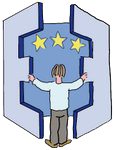European Hours
The intercultural and interactive dimension of the European Schools offers any number of opportunities to pupils to get involved, share and learn through different cultures. Ensuring a much wider view beyond the confines of the European Schools thanks to an education in changing perspectives and empathy in a spirit of openness to others, understanding and mutual respect.
In all, 1½ hours of European Hours a week are scheduled for the pupils in the P3, P4 and P5 classes.
At the ESS, the pupils in the three language sections are all thrown together and divided up into three groups, A, B and C, supervised by the three teachers responsible for extra classes (ECEC). The three languages taught are used to communicate with the teacher, as well as among the pupils. As the year progresses, the three groups (A, B, C) alternate, so that each group will be taught by each of the ECECs for one term.
The European Hours are spread throughout the week according to the following timetable:
- P3 classes: Monday afternoon;
- P4 classes: Tuesday afternoon;
- P5 classes: Friday afternoon.
The curriculum of the European Hours is designed to help to develop knowledge and encourage an awareness in the pupils of their national and European heritage (both past and present), their identity and general awareness, respect for the rights and beliefs of others, to shape members of society at once tolerant and benevolent. As citizens of Europe and of the world, pupils will gain an understanding and a critical appreciation of the values of other citizens, whilst nurturing a feeling of personal identity, self-esteem and awareness of their particular abilities.
Five fields are covered in the course of the three years, P3 to P5:
- European community
- Culture and civilisation
- Environment
- The developing world
- Living in a world of communication
Though the ECECs coordinate with each other on the fields to be covered in each term, they do not necessarily adopt the same approach to them.
Even though the programmes in place since September 2017 mean discussing complex issues which require the transmission of knowledge, the approach endeavours to be as active as possible.
Three main angles of attack guide our thinking and our programming:
- “Thinking European” (knowledge)
- “Feeling European” (attitude)
- “Acting European” (skills)

